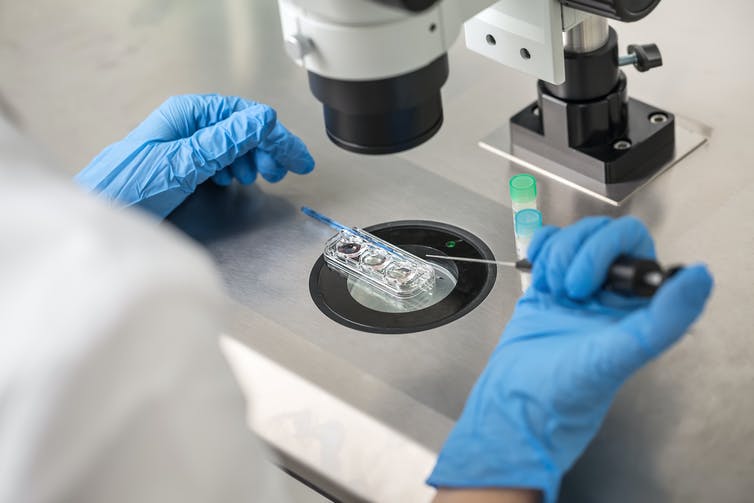
It has been almost 44 years years since the first in vitro fertilisation (IVF) procedure was successfully performed in 1978 in Lancashire, England. Since then, more than 8 million babies have been born worldwide to assisted reproductive technologies, such as IVF.
But despite its increasing use, the success rate of IVF still remains relatively low, at around 30%. There may be a number of reasons for this. In our recent paper, we argue that this low rate is partially due to the many unfavourable genetic changes that we carry in our DNA.
Genetic changes happen when mutations in our genes replace, insert or delete sections of DNA. More of these mutations are occurring now in humans because we’re having babies at a later age. As we get older, more mutations are likely to accumulate – meaning older parents are more likely to pass on genetic mutations to their children than younger parents. Mutations may also be caused by environmental factors (such as ultraviolet radiation in sunlight), or lifestyle choices (for example, smoking).
All of the genetic changes we inherit or develop throughout our lifetime constitute what’s known as our genetic load. This genetic load can impact our ability to reproduce. And as our study suggests, this may also affect our ability to reproduce via methods such as IVF.
Genetics and conception
Genetic mutations make evolution possible. They provide the new material for natural selection that allows species to adapt and evolve. While most of these mutations have no effect, some are slightly harmful. Such harmful mutations may cause diabetes or breast cancer, for example – or they may disrupt the healthy development of an embryo.
Human DNA carries more than 1,000 harmful mutations, most of which happened many generations ago. Yet, even though they are harmful, they have not (yet) been removed, because natural selection is a very slow process.
In addition to the large number of old mutations, new mutations also enter the population every generation. On average, every person acquires approximately 70 new mutations during their lifetime. But since some of these mutations are harmful, they need to be removed by natural selection, so that they aren’t passed on to future offspring. One of the most important times this happens is during natural conception.
When a child is conceived naturally, the body has many mechanisms in place to remove some of these harmful mutations.
For example, the female reproductive system is designed in such a way that only the fittest sperm cells can reach the egg for fertilisation. Although evidence is scarce, animal studies suggest that the sperm that reach the fertilisation site have a better DNA quality and potentially fewer mutations.
Mature eggs also undergo a sort of quality check during fertilisation. This too helps purge some of the genetic load. The implantation stage (where a fertilised embryo implants itself in the mother’s womb) is also important, as many embryos with severe genetic abnormalities tend to be lost naturally during pregnancies.

bezikus/ Shutterstock
However, IVF bypasses some of these natural mechanisms. During IVF, multiple eggs are harvested from the woman’s ovaries and fertilised with sperm in a laboratory. After they have been fertilised, the embryos are then returned to the womb. This reduces the opportunity for natural selection, which may therefore make IVF less efficient in reducing the genetic load. This could potentially increase the likelihood that harmful variants of genes may be passed onto the next generation.
So, the genetic load has two big implications for human reproduction. First, the genetic load of parents affects their ability to successfully reproduce. This is true both for natural conception, as well as for IVF. Second, by relaxing natural selection, IVF may let more mutations slip through the net. As such, it could slowly increase our genetic load in future generation. But there may be a solution.
The future of IVF
Fertility rates have suffered an unprecedented decline in recent decades. In fact, sperm count has fallen by about 50 to 60% between 1973 and 2011. It’s unclear why this is, but if this trend continues it could mean more people turn to IVF to conceive.
Yet we still know surprisingly little about human reproduction and the selective processes operating during natural conception. We must understand natural conception first if we want to improve assisted reproduction methods, including IVF. But recent technological advances in assisted reproductive technologies mean that we may soon be better able to counteract some of the genetic load in humans. For example selection at sperm level in the IVF process has been shown to improve the offspring fitness in animal models. In particular, selection of longer-lived sperm in zebrafish results in healthier offspring that live longer.
Advances in genomic technologies also have the potential to affect human evolution. Already, genomic data is effectively being used in clinical care, and the genomic bases of thousands of human diseases are now known. Furthermore, changes to our environment and our lifestyle are affecting the genetic load and human health. Most often, these changes have a negative effect, which makes these technological advances ever more important. As new advances are made, it will also be important to consider the potential consequences of using assisted reproductive technologies if these become the norm.
![]()
Cock Van Oosterhout receives funding from the Earth and Life Systems Alliance (ELSA), Norwich Research Park, UK.
Daniel Marcu receives funding from the Biotechnology and Biological Sciences Research Council.
Simone Immler receives funding from the Natrual Environment Research Council and the European Research Council.
























